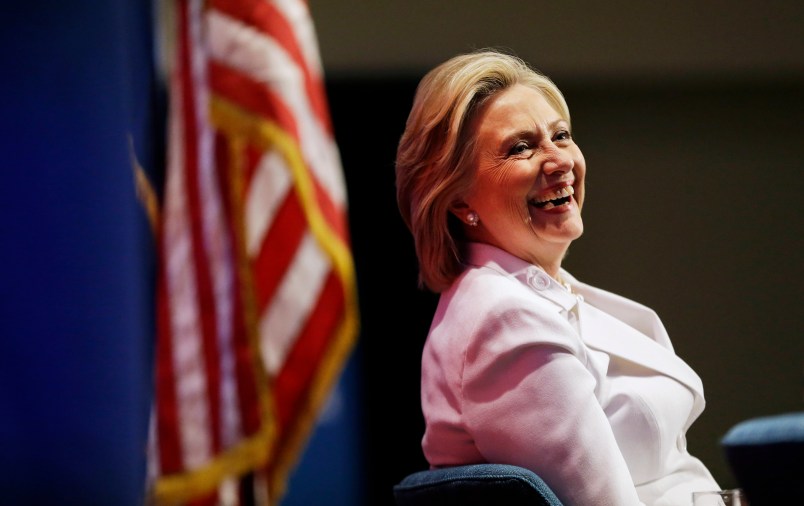Hillary Clinton signaled yet again that she’s really going to run a savvy, future-oriented campaign this time around by giving a speech at New York City’s New School on Monday, where she called out the “gig economy” for spreading job insecurity. “Many Americans are making extra money renting out a small room, designing websites, selling products they design themselves at home, or even driving their own car,” she explained. She praised this new economic model for “creating exciting economies and unleashing innovation,” but worried that it raised questions about “workplace protections and what a good job will look like in the future.”
The right-wing press went after Clinton for this, trying to paint her as a fuddy-duddy who just doesn’t understand the tech economy, but that attack is weak sauce. It’s clear, reading the speech, that Clinton does understand—not just the tech industry, but what kind of concerns are motivating young voters these days. Clinton, like the young voters she needs to win the election, understands that companies like Uber or Airbnb offer valuable services and she, as this quote makes clear, isn’t trying to take that away from anyone. She simply worries, as young voters do, that these businesses are exploiting loopholes in labor regulations, loopholes that she would like to close. “The best antipoverty program is a job, but that’s hard to say if there aren’t enough jobs for people to help lift themselves out of poverty,” she added, noting that young people ages 16 to 24 are struggling to get secure jobs that pay a decent wage.
Contrast Clinton’s speech with Jeb Bush’s tone-deaf comments about how Americans “need to work longer hours and, through their productivity, gain more income for their families.” The Bush campaign immediately put a spin on this, trying to argue that he was just trying to say that there needs to be more full-time opportunities for the many people stuck in part-time jobs. Even so, his prescription—work more hours—is garbled nonsense.
The grim reality is that just because a worker doesn’t have a full-time job with benefits doesn’t mean they aren’t overworked. A lot of part-time workers these days are basically put on call, which means they have to have their schedule open in case their employers want them to work, but only get paid if they are called in. Which means they are often putting in what amounts to a 40-hour work week, but only getting paid for part-time work.
And, as Clinton’s speech made clear, a lot of these workers are being classified as contract workers. For many in the gig economy, they work full-time hours—often more—but they don’t get any full-time benefits, like health insurance, retirement, or some kind of job security. They often are already working as hard as they possibly can, and the only prescription that Bush has for them is to try to dig out a few more hours a day to work.
But, as Clinton’s speech makes clear, she understands that just because you work more doesn’t mean you’re getting treated like a full-time worker. Her argument isn’t just the moral one, it’s also smart politics. Workers, especially young workers, know intimately what she’s talking about. As Shane Ferro at Business Insider points out, the gig economy has been instrumental in suppressing wages for most workers outside of the wealthiest ten percent. In addition, being a gig worker—even if you work the lengthy, body-destroying hours that Bush has in mind for you—is just plain expensive. Since you don’t get benefits, your actual income is much lower than it would be if you were paid the same at a full-time job. For those who have to work at places like Uber, your actual take-home pay after you cover gas and car expenses is even lower.
It’s also an issue that can help tie together Millennial voters with the older, union worker base that Clinton has traditionally leaned on. Young voters are understood, for good reason, as alienated from labor organizations, largely because they have almost no real access to organized labor. But this issue unites these two Democratic bases. The young voters want more job security and fairer wages for their work. Labor wants to preserve an economic system where people work full-time jobs with security and benefits. Their interests align perfectly on this issue. We just need some leadership to bring them together, and Clinton’s campaign is as good a place as any to start on that front.
Amanda Marcotte is a freelance journalist who writes frequently about liberal politics, the religious right and reproductive health care. She’s a prolific Twitter villain who can be followed @amandamarcotte.







Hmmmm…
The article says, “By Hillary Clinton Published July 14, 2015” yet at the conclusion of the article it appears Amanda Marcotte was the author.
What’s up with that?
~OGD~
@AmandaMarcotte
I see this:
ByAMANDA MARCOTTEPublishedJULY 14, 2015, 6:00 AM EDT
I do too, though to be fair, it doesn’t read like her stuff that is usually posted on TPM. No broad strokes accusing men of evil doings.
Uh, no. Young voters aren’t going to care.
All hours where a person is ‘on-call’ but not working should be subject to half-wages. If companies are going to pull that crap, then they need to pay for it. Workers should not have to wonder or worry if they are going to be called in or not.